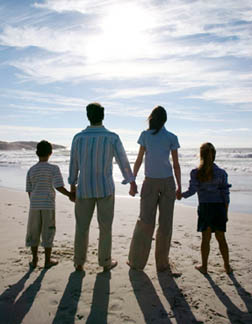With the political campaigns and conventions in full swing, it’s a great time to talk to our kids about what’s in the news and take advantage of teachable moments.
How much do your kids know about the election? One teacher in New York reported that she was surprised when a second-grader asked her if she thought there should be a limit to the amount candidates can spend on their election. Another said, “My dad says you have to have good hair to get elected President.” One child heard a candidate talk about gun control. Another questioned why a candidate talked so much about taxes.
 A father’s modeling includes being a responsible citizen. Often, politics arouse pessimism or sarcasm from people, and fathers who demonstrate that are sending a powerful message to their children. (This may be one reason why less than four in 10 eligible voters under age 30 actually vote.)
A father’s modeling includes being a responsible citizen. Often, politics arouse pessimism or sarcasm from people, and fathers who demonstrate that are sending a powerful message to their children. (This may be one reason why less than four in 10 eligible voters under age 30 actually vote.)
Instead, we need to remember the bigger picture: we’re sending out our children as ambassadors who will make a difference in the world and for future generations. We can help them create a positive vision for that future.
On a practical level, opportunities to teach our children about this year’s election and the political process are all around us. We should be good models by actively learning about the candidates and preparing ourselves to vote responsibly. We can also take a more direct approach to engaging our children on these topics on a day-to-day basis.
It’s likely that your school-age children are hearing a lot about the election, so have dinnertime conversations about what they’re hearing. Ask to see what they’re reading about it. Watch and read about the election together so you can answer questions, address fears, and provide context. With older kids, talk about how the media is covering the election and whether the media is objective. Also, initiate deeper discussions on the issues and allow them to disagree with you on some things.
Al Quie, former congressman and governor of Minnesota, has told about how discussions about politics and many other topics during car rides with his father—even from a young age—inspired him and prepared him for his years in public service. You never know what a discussion with your child might lead him or her to get involved in someday.
See more tips for parents on the Scholastic website.
ACTION POINTS
- Have your reference books and/or your Internet search engine readily available so you can look up geographical areas, define words that are discussed, and look up facts about different facets of the government.
- With all the media coverage of the election, try not to overwhelm your child with information. Make sure you do lots of simple, fun things together this fall.
- With older kids, talk about larger topics such as the importance of voting, freedom of expression, and what role government should play.
- Volunteer for a candidate you support and take your child along.
- Use online resources to help you educate your kids in this area. See the Scholastic Parent Guide to the 2008 Presidential Elections and information on elections from Congress for Kids.
- With your older children, discuss political issues that have a connection to your values and your worldview.

